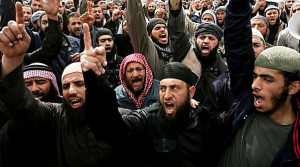
As expected, the military coup that overthrew Mohamed Morsi – a supporter of the establishment of Sharia law in the country – has not created conditions for stabilization. The Muslim Brotherhood has refused to recognize the forcible removal by the army of the legitimately elected president. They are prepared to vigorously defend their position and go to extreme measures in their fight against supporters of a secular state. This leaves no chance for a bloodless outcome to the crisis and leads the country into civil war, as was in the case in Libya and is now happening in Syria.
The army handed over Egypt’s former president Hosni Mubarak in hopes of keeping its position in the future political system of the country. These hopes were justified. Next came the turn of Mohamed Morsi. The Egyptian “liberal plankton,” which operated in the social networks, emerged victorious. It must be said that the army made a risky choice in backing the supporters of secular development of the state. Like any non-systemic opposition, they lack not only authoritative, charismatic leaders, but also a coherent social program to solve the country’s real problems. They are opposed by seasoned fighters who have been through training camps in Pakistan, and participants of wars in Afghanistan and Iraq. These are radical Islamists who have an ideology and determination to take up arms to fight for their beliefs.
But upon returning to power, it remains to be seen whether they would be able to solve the serious social problems of the country, among which the most pressing are:
– the use of water resources of the Nile;
– the provision of food for the population;
– the activity of militants in the Sinai Peninsula;
– uncontrolled population growth.
The Islamists do not have a program to deal with these problems, and their zeal and willingness to fight and die for their ideals will not help to solve them. Nonetheless, the Islamists, having recovered from the shock of defeat, are again rallying their forces and starting to battle their opponents. As it was in Afghanistan, now it is happening in Egypt, and next will be Syria, where the armed opposition is losing to government forces.
In Egypt, the Muslim Brotherhood have announced the mobilization of supporters, and do not recognize the legitimacy of the ousting of Morsi. The fight is gradually moving in the direction of a power struggle, amounting to the beginning of civil war. The signal of its start is the storming of the airport and air force base in El-Arish. Sinai, located in mountainous desert terrain with stockpiles of weapons, will apparently be its main launching ground.
Thus, we are witnessing a swing of the pendulum in the Egyptian revolution: overthrow of Mubarak – temporary rise to power of the military – elections and rise to power of Islamists – another surge of protests – military coup and establishment of a temporary civilian government, to another wave of protests on popular discontent over unresolved socio-political problems.
As for the situation in Syria, there has been an important event worthy of note: the U.S. Congress blocked a bill on supplying arms to Syrian rebels. This suggests that they are losing the direct support of the West. However, this little improves the situation, as clandestine arm supplies are passing through Jordan and Turkey.
Nonetheless, the civil war in Syria is coming to its logical conclusion, signified by the victory of government forces. But that does not mean the beginning of a process of stabilization and the end of chaos in the country. A new phase of confrontation with the opposition will take the form of combating terrorism, the purpose of which will be further archaization of the socio-political environment, destruction of the remnants of the country’s economy, creating an atmosphere of fear and public discontent with the authorities. Radical Islamists with support from abroad (mainly from Qatar) tried to implement such a scenario in Russia, where a few thousand militants who remained scattered throughout the North Caucasus maintained tension throughout the whole region for several years after the formal end of the second Chechen war.
Now the army of Syria, which at the price of great losses gained experience in battling the armed opposition, will have to learn to fight against terrorism. And here Russian experience may prove to be useful.
In general, it should be noted that the social and political chaos that is deepening in Middle Eastern countries provides a fertile environment for the emergence of a charismatic personality, on the scale of Ayatollah Khomeini in Iran, able to use their authority to establish order in the region in accordance with the rules of pure Islam, which could quite possibly mean the birth of an Arab caliphate of the 21st century.
Vladimir Karyakin, Candidate of Military Sciences and a Senior Fellow in the Department of Defense Policy of the Russian Institute for Strategic Studies, exclusively for the online magazine “New Eastern Outlook”.